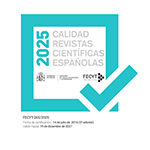Comes Hispaniarum Octavianus - the special envoy of Constantine the Great (some Remarks)
Abstract
Text is devoted to Octavianus, one of the comites Hispaniarum of Constantine the Great (306-337). Counts of Spain belonged to the group of emperor’s trusted collaborators, who were dispatched to the dioceses to inform the ruler about the situation there and to put it in right if necessary (comites dioecesium). Constantine’s comites Hispaniarum should be distinguished from the Military Commanders in the diocese of Spain also called comites Hispaniarum by the Notitia Dignitatum. On the contrary, they were a kind of civil officials, the superintendents of ordinary governors of the provinces. The first of Constantine’s comites Hispaniarum was Octavianus in 316-317 A.D, who was not only the first count of Spain but also the very first known comes dioecesium at all. Two constitutions of the Emperor are addressed to him —CTh 9,1,1 = C 3,24,1 (316 A.D.)— ordering the loss of senators’ prescription of forum in all criminal trials when they were caught, especially the senators who abducted a maiden or invaded the boundaries of another and CTh 12,1,4 (317 A.D.) — devoted to a particular question of decurion’s cursus honorum. Author indicates that both constitutions were emperor’s rescripts, issued probably in/around Serdica (Sofia in Bulgaria). He points that at least since the publishing of the Theodosian Code in 438 A.D. they acquired binding force in all provinces of the Roman empire, although at the beginning these constitutions were probably applied only to the cases which had happened in the diocese of Spain. Author discusses the opinions concerning the person of count Octavianus and he states that it is better to distinguish Octavianus, the comes Hispaniarum and Rufinus Octavianus, corrector Lucaniae et Brittorum (Italy) in 313. He points that Octavianus was probably a descendent of a Roman family as his traditional name suggests, maybe the member of some senatorial family, like most of different comites in the epoch of Constantine the Great but probably he was not of Spanish origin or a Christian. Author deduces that Octavianus was comes Hispaniarum not for a long time perhaps between Summer/Fall of 316 and the end of 317 or beginning of 318. He indicates that Octavianus judged some disputes which arose in Spanish dioceses as at least CTh 9,1,1 shows (received by Octavianus in Corduba/Córdoba, the capital of Roman province Baetica and the former seat of one of conventus iuridici). He suggests the possibility of Octavianus’ visits also in other provinces of Spanish diocese and their capitals or even old capitals of conventus iuridici because of the nature of comites diocesium missions. According to his opinion, it is not excluded that the emperor Constantine could be well informed about the state of affairs in Spanish diocese — and the necessity of the extraordinary inspection of emperor’s comes— thanks to the contacts of his trusted collaborator and spiritual adviser, bishop Ossius of Cordoba.Downloads
##submission.format##
Licenza
La revista Gerión. Revista de Historia Antigua, para fomentar el intercambio global del conocimiento, facilita el acceso sin restricciones a sus contenidos desde el momento de su publicación en la presente edición electrónica, y por eso es una revista de acceso abierto. Los originales publicados en esta revista son propiedad de la Universidad Complutense de Madrid y es obligatorio citar su procedencia en cualquier reproducción total o parcial. Todos los contenidos se distribuyen bajo una licencia de uso y distribución Creative Commons Reconocimiento 4.0 (CC BY 4.0). Esta circunstancia ha de hacerse constar expresamente de esta forma cuando sea necesario. Puede consultar la versión informativa y el texto legal de la licencia.












